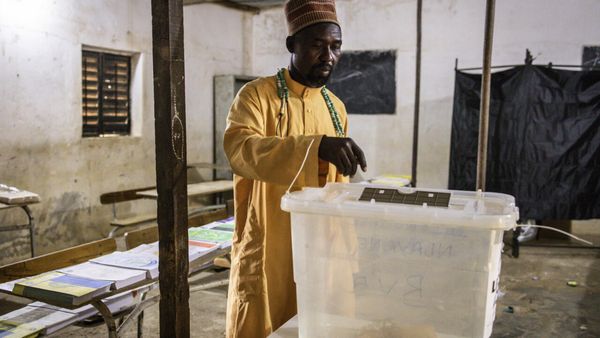
Are people in the UK more or less honest now than they were 50 years ago? Peter Scrimshaw
Send new questions to nq@theguardian.com.
Readers reply
Asking “Are we getting more dishonest?” next to a picture of Boris Johnson is like asking about the relative strength of gravity beside a picture of a black hole.
I’m sure as a whole we are no more dishonest, it just happens that a man whose well-known disinclination for honesty was allowed to become prime minister and this has soured our current opinion of society as a whole. NeverAFT1983
I think it’s harder to be rude, dishonest or cheat someone you know well or are dealing with in person. When we are dealing with faceless companies online, perhaps we aren’t thinking about the people we are interacting with – often we don’t even get to interact with a person. I think that tempers our moral reactions to a degree. People are more likely to be rude and offensive online than in a face to face situations.
Sometimes, we don’t even recognise our dishonest behaviour for what it is; for instance, the trend of buying clothes online, wearing them for an intended occasion and then returning them. It’s highly dishonest, but feels victimless, because you never interact with anyone. Think of doing the same thing in a small local boutique – I bet a much smaller percentage of people would do that.
In the same vein, I get annoyed when I see big businesses (AKA brands) complaining about the prevalence of shoplifting. I think they have brought a lot of that on themselves by replacing staff with machines and cutting staff pay and benefits. An increase in dishonest behaviour is a predictable consequence of cost-cutting measures that show disrespect for customers and staff. So, yes, I think the more impersonal our society becomes, the more we justify dishonesty as victimless and the more dishonest we become. HonoraM
Someone once said we all have a right to our own opinions, but not our own facts. The problem today is that everyone is tooled up to the nines with their own facts. As a result, if everyone owns their own facts, then who could ever be described as a liar … Splutterer
On the odd time that I am given too much change, or a restaurant has forgot to put a dessert on the bill, I will point that out. I don’t know how many people do the same, but I’d say less than 50%. Quite a lot seem to base morality on what they can safely get away with rather than what’s right and wrong. PeteTheBeat
I don’t know about other people, but I am quite shocked by my own children sometimes. I would like to think I brought them up to be honest – and they certainly don’t spare me their honest opinions – but they have different standards, for sure. It seems to be because they see society as dominated by immoral capitalism. While I don’t suppose they would steal sweets in a corner shop, they have no compunction when it comes to correcting mistakes in a bigger shop, or not declaring correctly where they got on a train when the ticket man comes down the carriage. To me, anything dishonest is bad karma and not worth it. It’s disappointing. damsonjam
I think there is more dishonesty now because people like Trump and Johnson seem to have made lying fashionable (or at least not penalised). As more see nothing being done – and cyber seems to some to be a victimless crime – even the good may get lax. The use of smartphones and selfies (selfish?) are visible evidence of the increasing focus on “me” and “my rights” rather than helping others. Signed, a former Brownie/Guide. (OK, I’ve become my parents and grandparents …) jwkayaker
Johnson took advantage of the “decent chap” precedents, which happened to coincide with other lying leaders, notably Trump and Putin. Politicians, along with captains of industry and other leaders, wouldn’t get to a position of responsibility unless their word could be trusted. Some room for other opinions or judgments, but trust in statements of fact was the key. Johnson blew that out if the water by deliberately lying.
The astonishing fact was that the media would continue to report as if what was said were true – as if they had no real idea how to act when presented with outright lies. And so the lies became habitual and spread to the rest of the leadership team. Will it cause long-term damage? Almost certainly, but maybe not yet in most personal interactions. The business world, however, has been quick to take up Johnson’s example and will lie to the public whenever convenient, with little chance of ever being called out. leadballoon
In politics, I think that there is no comparison. Fifty years ago, politicians were expected to, and generally did, conform to a very high level of public probity. However, they also had rigid views on class, nationality and race that would be unacceptable today. On the other hand, present-day politicians have a broad and flexible liberal outlook but are very often corrupt, and sometimes brazenly so, knowing that getting caught would mean a rap on the knuckles, but would not preclude very lucrative post-political careers. InjunJoe
Technology (and social media) has enabled the sharing of untruths and gossip like no time before. Didn’t we used to ignore most people when they talked nonsense? And it’s everywhere, the whole darned world, not only in the UK. Sigh. alanincanada
As someone who was around 50 years ago, I think that society was much more honest back then. Get caught lying and your peers would see that you were castigated. Now, nobody seems to care and lying is just mainstream – as seen with the dreadful state of politics, where lies aren’t even denied, but smiled away. flugzeug
Rose-tinted nostalgia for things “back in the day” is a very human trait. I really don’t believe people in general were more or less honest than my childhood in the 1970s, or indeed my parents’ era of the 30s and 40s.
People now may be more open in certain areas – eg premarital sex, homosexual attraction – but I don’t really see the overall population as more honest per se. Pressure, temptation and opportunity to be dishonest may have shifted to other places or vehicles, but desire for money, power, sex and prestige will always drive human nature, and lying is often integral to exploiting any opening to achieve those goals. Drewlove
They just don’t hide it any more. EsKiusmi







